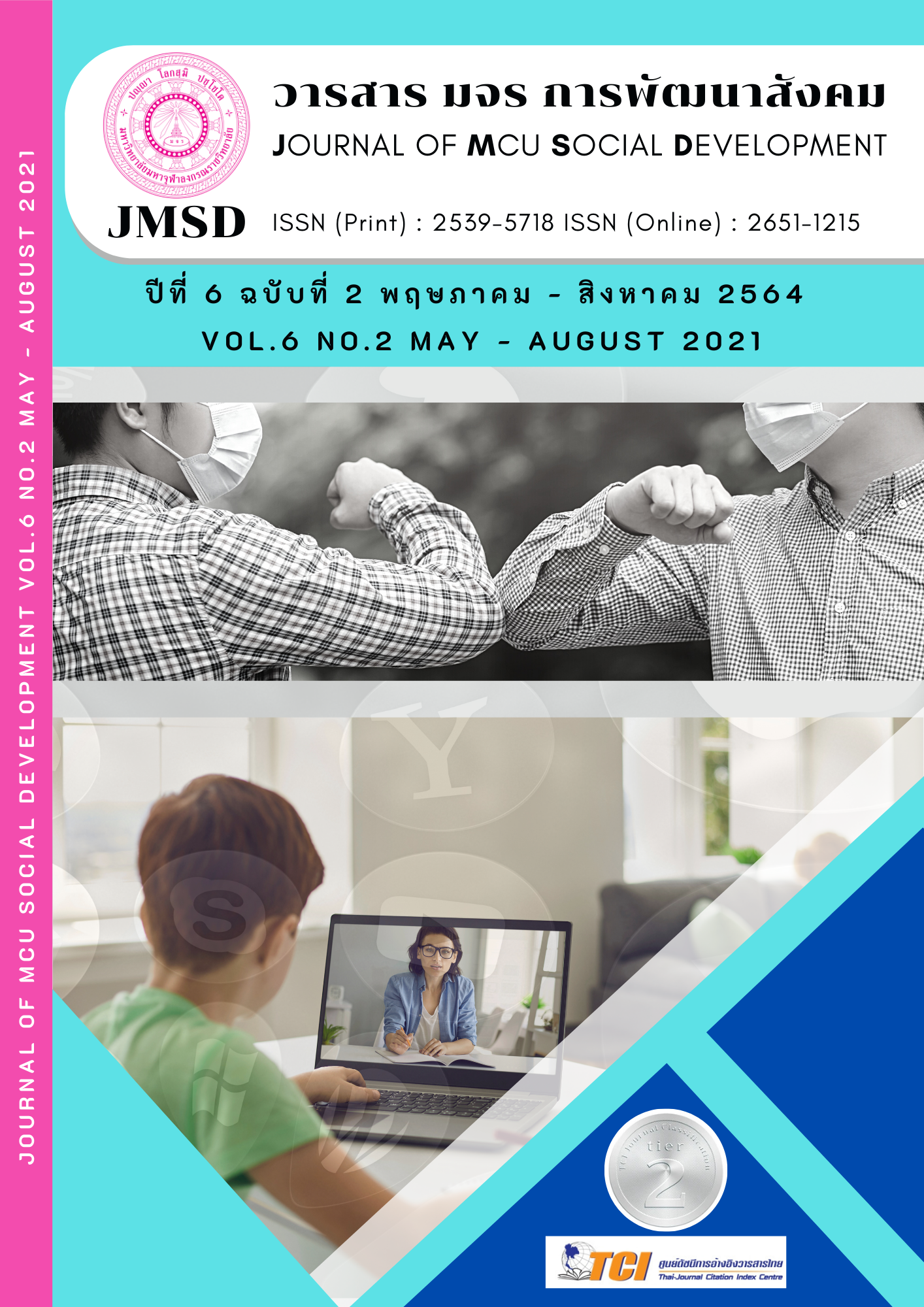พระพุทธศาสนาแบบไทยกับสื่อสังคมออนไลน์
คำสำคัญ:
สื่อสังคมออนไลน์, พระพุทธศาสนาแบบไทย, พุทธธรรมบทคัดย่อ
โลกยุคศตวรรษที่ 21 เป็นยุคแห่งสื่อสังคมออนไลน์ซึ่งได้สร้างประโยชน์ให้มนุษย์อย่างมหาศาลแต่ก็สร้างโทษให้อย่างมหันต์เช่นกันหากใช้ในทางที่ผิด ปรากฏการณ์เช่นนี้เกิดขึ้นทั่วโลก ประเทศไทยก็ตกอยู่ในสถานการณ์เช่นนั้น ประเทศไทยมีประชากรโดยส่วนมากนับถือพระพุทธศาสนาเป็นหลัก และพระพุทธศาสนามีคำสั่งสอนที่สามารถนำไปประยุกต์ใช้เพื่อความผาสุกของมนุษย์ได้ บทความนี้จึงมีความประสงค์อภิปรายพุทธธรรมเพื่อประยุกต์ใช้ในการแก้ไขปัญหาการใช้สื่อสังคมออนไลน์ในทางที่ผิด โดยจะยกกรณีตัวอย่างของการใช้สื่อสังคมออนไลน์ของพระสงฆ์ไทยเป็นตัวอย่างในการประยุกต์พุทธธรรมในการใช้สื่อสังคมออนไลน์เพื่อความผาสุก พระสงฆ์ไทยได้ใช้หลักพุทธธรรมไตรสิกขาซึ่งเป็นหลักแห่งทางสายกลางในการใช้สื่อสังคมออนไลน์แบบไม่เป็นเหยื่อและทาสของสื่อสังคมออนไลน์ ซึ่งเรียกการใช้สื่อสังคมออนไลน์โดยประยุกต์พุทธธรรมนี้ว่าเป็นปรากฏการณ์การของพระพุทธศาสนาแบบไทยกับการใช้สื่อสังคมออนไลน์ ที่จะเป็นตัวอย่างให้กับไม่ใช่แต่เพียงพระสงฆ์เท่านั้นแต่ยังจะสามารถประยุกต์ใช้กับสังคมแบบฆราวาสได้ด้วยหากตั้งใจปฏิบัติจริงจังเพื่อความผาสุกอย่างยั่งยืน
เอกสารอ้างอิง
Apsorn Sathientip at el. (2017). “A study of online social media violence and recognition of teenagers.” [in Thai]. A report from the Office of the Fund for Promotion of Health Promotion.
Chulanee Thianthai. (2020, online). Effect of Online Social Media on Thai Social and Cultural Changes from an Anthropologist's Perspective. [in Thai]. Retrieved from https://www.chula.ac.th/news/27969/.
Electronic Transactions Development Agency or ETDA. (2019, Online). Retrieved from https://www.etda.or.th/content/etda-เผย-อีคอมเมิร์ซ-ไทย-โตต่อเนื่อง-2561-3-2-ล้านล้านบาท.html.
Jittipan Kwamkanung and Marid Kaewchinda. (2016). Group counseling with stabilization techniques to enhance coping skills for cyberbullied youth. [in Thai]. Journal of Graduate Studies, Valaya Alongkron Rajabhat University, 10 (2), 40-52.
Kunya Phanichsiri and Benjaporn Tuntasood. (2016). “Social media addiction and attention deficit and hyperactivity symptoms in high school students in Bangkok.” Journal of the Psychiatric Association of Thailand, 61 (3).
National Statistical Office (2018). Reports on social condition, culture and mental health 2018. Retrieved from http://www.nso.go.th/sites/2014/DocLib14/News/2561/09-61/N21-09-61-1.pdf.
Office of National Buddhism. (2017). Database of Buddhism in 2017. Retrieved from http://www.onab.go.th/wpcontent/uploads/2016/12/onab_primaryinfo60edit.pdf.
Phra Maha Wuttichai Vajiramedhi. (2018, Online). Interview: Buddha Dharma 4.0 religion and challenge of technology. Retrieved from https://www.posttoday.com/life/healthy /548924.
Phramaha Thanit Sirivatthano. (2015). “The model and process of Buddha-Dhamma communication through social media of Buddhist monks in Thailand.” Rajabhat Chiang Mai Research, 16 (2) 76-86.
Phramaha Tawee Lalong. (2017). “The Buddhist theory for life in social media.” [in Thai]. Journal of Graduate Studies Review, 13 (3).
S. H. Hosseini (2008). Religion and Media, Religious Media, or Media Religion: Theoretical Studies, Journal of Media and Religion, 7: 1 - 2, 56 - 69, DOI:10.1080/15348420701838350.
The Economist. (2017). “The world’s most valuable resource is no longer oil, but data”. Retrieved from https://www.economist.com/leaders/2017/05/06/the-worlds-most-valuable-resource-is-no-longer-oil-but-data.
Thaniporn Jullasak. (2012). The Dissemination of Dhamma through online social media of Phra MahaWuthichai Vajiramedhi. Master of Arts Thesis. Department of Business Communication, Faculty of Communication, Dhurakij Pundit University.



